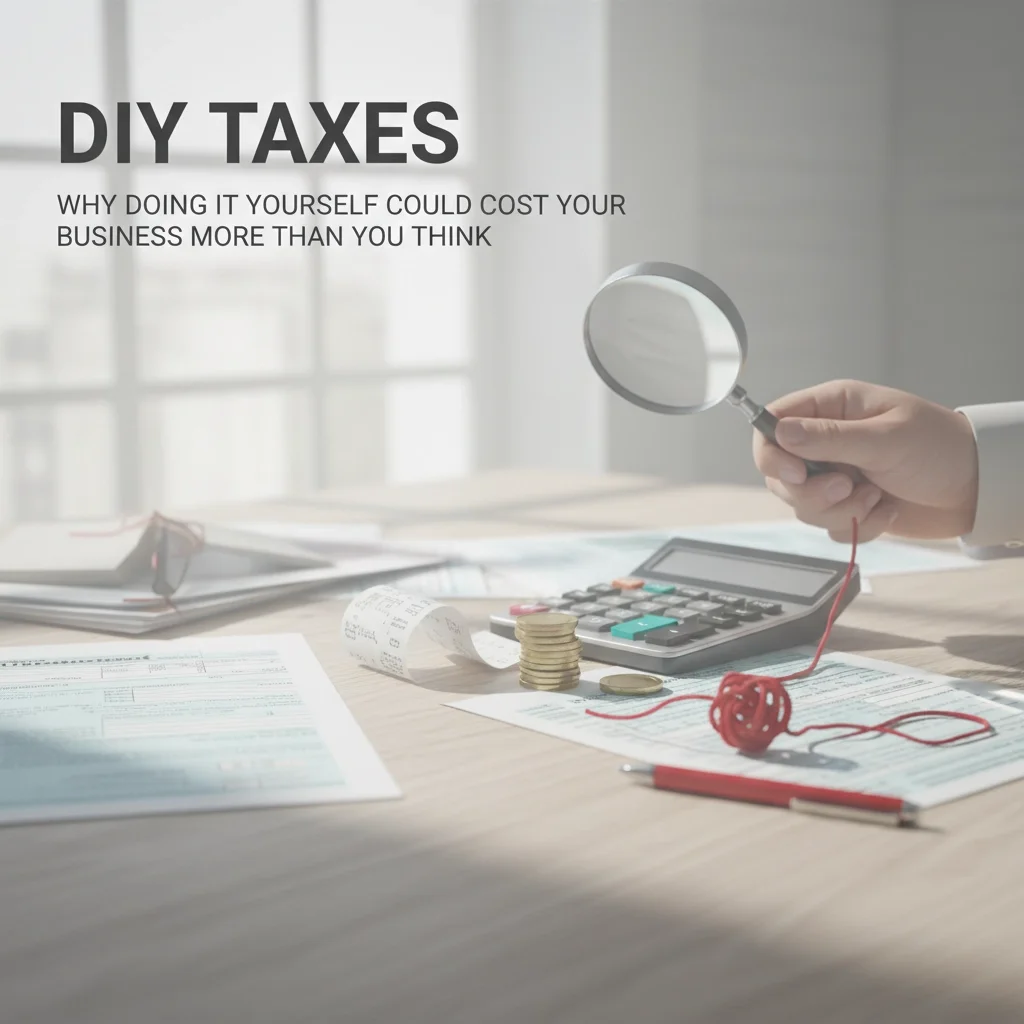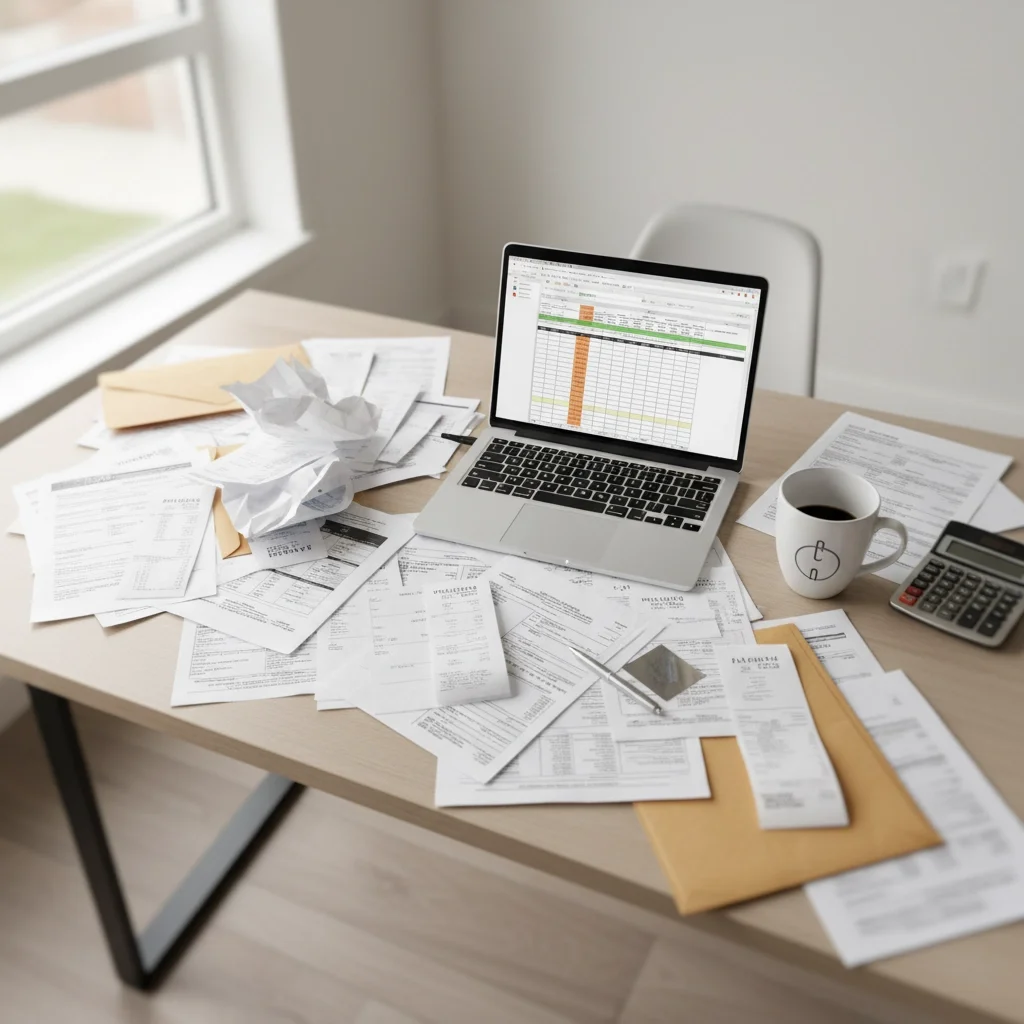DIY Taxes: Why Doing It Yourself Could Cost Your Business More Than You Think
TurboTax makes it look so easy in those commercials, right? Just answer a few questions, upload some documents, and boom, your taxes are done for a fraction of what an accountant would charge.
Here's the problem: for business owners, that "savings" often turns into one of the most expensive mistakes you can make.
Sure, you'll save a few hundred dollars upfront. But between the hours you'll waste, the deductions you'll miss, and the potential errors that could trigger an audit, DIY taxes often cost small business owners thousands more than they would have spent on professional help.
Let's break down why doing your own business taxes might be costing you way more than you think.
The Time Trap: Your Hours Are Worth More Than You Realize
Most business owners underestimate how long taxes actually take. We're not talking about the simple personal return you used to file as a W-2 employee. Business taxes are a different beast entirely.
Small business owners spend an average of 20+ hours per month on financial tasks, including tax prep and bookkeeping. That's not just during tax season, that's year-round. For tax season specifically, most business owners spend 15-25 hours preparing their returns.
Let's do some quick math. If your time is worth $100 per hour (and it probably should be valued higher), those 20 hours cost you $2,000 in opportunity cost. Every month.
Think about what else you could do with those 20 hours:
Follow up with potential clients
Develop new products or services
Improve your marketing
Actually take time off to recharge
Any of these activities would likely generate more value than the few hundred dollars you "save" by doing your own taxes.
The Expensive Mistakes You Don't See Coming
Here's where DIY gets really costly: the mistakes you don't know you're making.
Misclassifying Income and Expenses
One common error is incorrectly categorizing 1099 contractor income. Put it in the wrong box, and you might initially avoid self-employment tax. Sounds good, right? Wrong. When the IRS catches this (and they will), you'll owe the original tax plus penalties and interest. What started as a "smart" move becomes a financial disaster.
Missing Business Structure Benefits
If you're an LLC or S-Corp, there are specific tax strategies and deductions available to you. DIY software treats all businesses the same, so you miss out on structure-specific benefits that could save you thousands.
Incorrect Quarterly Payments
Many DIY filers forget about quarterly estimated taxes or calculate them wrong. Miss these payments, and you're looking at penalties that can run into the thousands, money that goes straight to the IRS instead of your business.
The Deductions You're Leaving on the Table
Tax software is designed to help you file taxes, not optimize them. There's a big difference.
A good accountant doesn't just enter your numbers, they actively look for ways to reduce your tax burden. Here are deductions most DIY filers miss:
Home Office Deductions
The home office deduction is tricky. Most DIY software either oversimplifies it (costing you money) or makes it so complicated that business owners skip it entirely (also costing you money).
Strategic Equipment Purchases
Section 179 allows you to deduct the full cost of business equipment in the year you buy it, up to certain limits. But timing matters. A professional can help you strategically time purchases to maximize your tax benefits.
Business Meals and Entertainment
The rules changed recently, and many business owners don't know what's deductible anymore. Miss out on these deductions, and you're essentially paying taxes on money you never actually received as profit.
Professional Development and Training
Conferences, courses, coaching, these are all deductible business expenses that many DIY filers either don't claim or don't document properly.
Audit Risks: When "Good Enough" Isn't Good Enough
Let's talk about the audit risk. Business returns are more likely to be audited than personal returns, especially if you're claiming significant deductions or have complex income streams.
DIY software can help you file, but it can't represent you if the IRS comes knocking. And trust me, an audit notice is not the time to wish you'd hired a professional from the start.
Even worse, many DIY mistakes create red flags that increase your audit chances:
Unusually high deductions compared to income
Inconsistent reporting year over year
Misclassified expenses that don't make sense
When you get audited, you'll need professional help anyway. But now you're paying for representation AND dealing with potential penalties for mistakes that could have been avoided.
The Compliance Complexity You're Ignoring
Business tax laws change constantly. What worked last year might not work this year. Professional accountants stay on top of these changes because it's their job. You, on the other hand, are trying to run a business while keeping up with an ever-changing tax code.
Recent examples:
COVID-related tax benefits and loan forgiveness rules
Changes to business meal deduction percentages
New depreciation rules for vehicles and equipment
Updates to retirement contribution limits
Miss these changes, and you either overpay taxes or face compliance issues later.
When DIY Might Actually Work
To be fair, there are situations where DIY makes sense. If your business is truly simple, say, you're a freelance writer with minimal expenses and straightforward income: tax software might be adequate.
But that describes a tiny percentage of business owners. The moment you have:
Multiple income streams
Employees or contractors
Significant business expenses
Business equipment or property
Complex business structures
You've moved into territory where professional help typically pays for itself.
What You Actually Get with Professional Help
Working with a qualified accountant isn't just about filing your taxes. It's about having a strategic partner who:
Proactively Identifies Tax Savings
A good accountant reviews your situation throughout the year, not just at filing time. They spot opportunities to save money and suggest strategies you'd never think of on your own.
Provides Year-Round Support
Questions come up all year long. Is this expense deductible? How should I structure this new revenue stream? Should I buy equipment now or wait? Having professional guidance available when you need it prevents costly mistakes.
Offers Peace of Mind
There's real value in knowing your taxes are handled correctly. No more lying awake wondering if you made a mistake. No more stress about potential audits. Just confidence that everything was done right.
Usually Saves More Than They Cost
Here's the kicker: most business owners find that their accountant's fees are less than the tax savings they identify. It's like having someone pay you to reduce your taxes.
The Bottom Line: Your Business Deserves Better
DIY taxes might seem like smart budgeting, but for most business owners, it's false economy. You end up spending more time, missing more opportunities, and taking on more risk than if you'd just hired a professional from the start.
Your business generates income because you're good at what you do. Let a tax professional handle what they're good at, so you can focus on growing your business instead of wrestling with tax forms.
The question isn't whether you can do your own taxes: it's whether you should. And for most business owners, the answer is a resounding no.
Ready to stop leaving money on the table and start treating your taxes like the strategic business tool they should be? Contact ARC Business Advisors today for a consultation. We'll show you exactly how professional tax planning can save your business money while giving you back your time and peace of mind.
Because your time is too valuable to waste on DIY tax mistakes.






